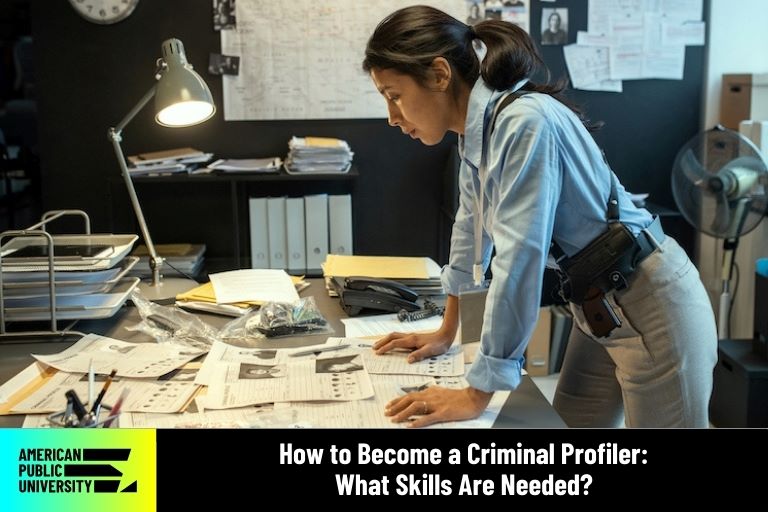By Dr. Jarrod Sadulski | 04/17/2024

Becoming a criminal profiler is an exciting and satisfying career path in the criminal justice field. Criminal profilers contribute to investigations by examining the psychology, actions, and backgrounds of perpetrators.
Understanding the psychology of criminals through criminal profiling can be helpful for identifying their modus operandi, which can then lead to solving crimes. If you’re considering becoming a criminal profiler, be sure to conduct informational interviews with the Federal Bureau of Investigation or other law enforcement agencies that employ profilers.
These informational interviews can provide valuable insight into profilers’ daily activity. Additionally, students who are curious about how to become a criminal profiler will likely have several career paths from which to choose.
What Do Criminal Profilers Do?
Criminal profilers can map out the impulses, behaviors, personality types, and emotions that lead someone to commit criminal acts. Criminal profiling dates back to the establishment of the FBI's Behavioral Analysis Unit (BAU) in 1972.
The BAU uses criminal profiling, also known as behavioral analysis, to analyze a suspect's motivation, the selection of victims, and relationships to other crimes. Behavioral analysis can also be useful in establishing a sequence of events.
The FBI also uses behavioral analysis to apply science-based methods in suspect interviews, and they develop threat assessments based on an offender's pattern of thinking and behavior. Behavioral analysis can help determine the likelihood that someone is planning an attack on a target and can be used to link cases together, according to the FBI.
Recognizing behavioral patterns through criminal profiling can help prevent and solve crimes. The FBI operates a Behavioral Threat Assessment Center at the national level. It is a multi-agency task force designed to prevent terrorism through analysts and mental health practitioners who provide threat assessments. The Behavioral Threat Assessment Center applies behaviorally based research and operational support to prevent terrorism and violence.
According to the Federal Bureau of Investigation, violence directed at a particular target can be prevented by identifying a suspect’s concerning behavior that he or she displays before an incident occurs. For example, the FBI has found that research involving active shooters indicates:
- Offenders had a significantly reduced ability to cope with problems.
- Offenders believe violence is the only way to solve their problems.
- Disclosures of their violent plans exist.
- Conflict with others, anger, and aggression exist prior to the incident.
Each of these factors can indicate to criminal profilers when someone may be a threat to the public. They can then pass that information to law enforcement officers, who can use that information to prevent crimes from occurring.
Criminal profilers typically create profiles (detailed descriptions of suspected offenders) using forensic pathology, human behavior traits and crime scene analysis. These profiles are then sent to police departments so they can be used for ongoing cases by criminal investigators.
The Phases of Criminal Profiling
Understanding criminal minds and developing actionable intelligence is essential for a profiler. The profiler must know criminal patterns, criminal psychology, and trends in order to identify threats.
As part of the criminal justice system, the role of a profiler is rooted in criminological theories that may help to explain crime. For example, the Positivist Theory posits that social conditions – such as external, biological, and psychological factors – influence someone participating in criminal behavior.
A criminal profiler can combine these factors along with personal attributes to determine if someone is either likely to have committed a crime or if they are likely to commit a crime in the future.
According to LinkedIn, there are several phases of criminal profiling, which include:
- Examining evidence
- Reconstructing crime scenes
- Reviewing offender profiles
- Examining victimology
Examining Evidence
Examining evidence is an essential part of criminal profiling, because evidence will reveal if an offender follows certain patterns. For example, an arsonist may always use the same accelerant, the same type of target, and the same ignition source.
A criminal profiler can recognize patterns, which can help to narrow down and pinpoint the people who commit crimes, especially violent offenses. This process commonly involves reviewing evidence to identify offender characteristics and habits. Evidence may include crime scene details, witness accounts, and other physical evidence.
Reconstructing Crime Scenes
Reconstructing a crime scene is a common practice in the criminal justice field. For instance, criminal profilers can piece together the events that occurred before a crime was committed, as it was happening, and after the crime, according to LinkedIn. Developing a timeline in this way also allows criminal profilers to tie other offender characteristics and profiles to a particular crime.
Reviewing Offender Profiles
Offender profiles are at the heart of criminal profiling. According to LinkedIn, synthesizing information from different parts of the investigation aids in creating an offender profile for criminal investigators to use. The offender's criminal history, personal characteristics, criminal behavior, and modus operandi are usually included in the profile.
Examining Victimology
Victimology refers to the victims chosen by a criminal, and it examines the experiences, consequences, and characteristics of the victims, according to LinkedIn. Victimology is essential in criminal justice because it can reveal why someone was targeted by a criminal and other details of the offender.
For instance, someone who is prone to becoming a victim may be targeted by an offender. As a result, understanding victimology helps criminal profilers identify offenders who have vendettas, want to achieve vengeance, or have another reason to target a specific victim.
What Skills Do You Need to Be a Criminal Profiler?
A successful criminal profiler can analyze complex criminal cases to identify offenders and their modus operandi. The ability to process minute details is an invaluable strength in this field.
Analytical skills are also vital for criminal profilers. There is often a lot of information to sort through when a profiler builds an offender profile.
Analytical skills are often paired with critical thinking skills to enable a criminal profiler to uncover complex patterns and identify potential suspects. Criminal profilers’ work is instrumental in ensuring proper offender identification is made.
Furthermore, criminal investigative analysis skills are a must for anyone who seeks this type of job. Criminal profilers routinely analyze detailed crime scene reports, detective reports, and case files. As a result, they need to notice case details other investigators may miss.
Criminal profilers also need:
- A deep understanding of both criminal procedure and psychology
- A solid understanding of criminal behavior
- Good oral and written communication skills (for instance, criminal profilers will have to write reports)
Emotional detachment also comes into play. Criminal profilers spend many hours analyzing the thought processes of criminals who commit violent acts and participate in inhumane criminal activities. Criminal profilers must be able to distance their emotions from their work.
How to Gain Relevant Work Experience
Law enforcement agencies may provide the opportunity for aspiring criminal profilers to gain relevant experience. While the majority of criminal profilers are employed by the FBI's Behavioral Analysis Unit or the National Center for the Analysis of Violent Crime, law enforcement agencies may also provide potential opportunities to gain experience.
Aspiring criminal profilers should seek out potential opportunities with their local law enforcement agencies and inquire about the educational requirements needed to become a criminal profiler. Some police departments may require post-secondary education in criminal justice or a similar relevant field.
Criminal Profiler Training and Education
Anybody who is curious about how to become a criminal profiler will probably have questions about the education needed for this type of role. Going to a police academy and getting hands-on training can be helpful, especially when that experience is coupled with a formal college education. In fact, a bachelor's degree is usually required for certain jobs in the criminal justice field.
A criminal justice program that offers coursework in crime scene analysis, criminal investigative analysis, and criminology (the psychology of offenders) can be a practical choice. Similarly, studying abnormal psychology can help you to understand the mindset of different types of criminals. You may also wish to deepen your understanding of the legal system and legal issues, which are also explored in criminal justice courses.
A Criminal Profiler Plays a Key Role in Ensuring Justice
Becoming a criminal profiler can be an immensely satisfying experience. Criminal profilers play a key role in public safety and law enforcement. Their work in crime analysis can mean the difference between a case going cold and a violent offender being convicted and incarcerated.
Also, even more opportunities often await criminal profilers who have gained with substantial experience. For instance, criminal profilers may serve as expert witnesses, provide expert testimony, and become jury consultants.
Are You Interested in How to Become a Criminal Profiler?
The work of a criminal profiler requires an in-depth understanding of human behavior, criminal minds, law enforcement principles, and crime typologies. As a profiler, you can help ensure justice is served for victims and their families.
To help students gain the knowledge needed to pursue job opportunities in criminal profiling, American Public University (APU) offers an online bachelor’s degree in criminal justice. At APU, you can complete your courses in our criminal justice program online and learn from faculty with real-world experience. Courses start monthly and have no set login times.

Dr. Jarrod Sadulski is an associate professor in the School of Security and Global Studies and has over two decades in the field of criminal justice. He holds a bachelor’s degree Criminal Justice from Thomas Edison State College, a master’s degree in criminal justice from American Military University, and a Ph.D. in criminal justice from Northcentral University.
His expertise includes training on countering human trafficking, maritime security, mitigating organized crime, and narcotics trafficking trends in Latin America. Jarrod has also testified to both the U.S. Congress and U.S. Senate on human trafficking and child exploitation. He has been recognized by the U.S. Senate as an expert in human trafficking.
Jarrod frequently conducts in-country research and consultant work in Central and South America on human trafficking and current trends in narcotics trafficking. Also, he has a background in business development.

